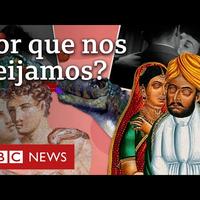Dia dos Namorados: o que acontece no nosso corpo durante o beijo?
Valentinstag: Was passiert mit unserem Körper, wenn wir uns küssen?
Valentine's Day: what happens to our bodies when we kiss?
San Valentín: ¿qué ocurre en nuestro cuerpo durante el beso?
Valentijnsdag: wat gebeurt er met ons lichaam als we zoenen?
Walentynki: co dzieje się z naszymi ciałami, gdy się całujemy?
Sevgililer Günü: Öpüştüğümüzde bedenlerimize ne oluyor?
Nossa respiração fica mais profunda e irregular. O coração acelera
|||||||||accelerates
Our breathing becomes deeper and more irregular. the heart speeds up
As pupilas se dilatam, talvez por isso muitas pessoas fecham os olhos enquanto beijam.
The pupils dilate, perhaps that's why many people close their eyes while kissing.
Segundo o antropólogo Vaughn Bryant, o beijo estimula, principalmente, três sentidos:
According to anthropologist Vaughn Bryant, kissing mainly stimulates three senses:
O primeiro é o tato, já que nossos lábios são extrememente sensíveis.
||||touch|||||||
The first is touch, as our lips are extremely sensitive.
Bryant explica que temos mais terminações nervosas nos lábios
Bryant explains that we have more nerve endings in the lips
do que em qualquer outro lugar do corpo, tirando algumas partes dos órgãos genitais.
than anywhere else on the body, except for some parts of Organs genitals.
Depois vem o paladar. Cada pessoa tem um gosto único e alguns são
|||taste preference|||||||||
Then comes the taste. Each person has a unique taste and some are
melhores do que outros em reconhecer sabores.
better than others at recognizing flavors.
Por último vem o olfato. O poeta Ovidio descreveu
||||sense of smell||||
Last comes the sense of smell. The poet Ovid described
o cheiro dos beijos como o de maçãs amadurecendo dentro de um baú.
||||||||ripening||||
the scent of kisses like apples ripening in a trunk.
Sheril Kirshenbaum é autora do livro “A ciência do beijo”. Ela
conta que existem muitas teorias sobre o por quê de nos beijarmos.
says there are many theories about why we kiss.
Já na infância, quando somos beijados por nossos pais ou quando usamos os lábios na amamentação,
Already in childhood, when we are kissed by our parents or when we use our lips in breastfeeding,
nosso cérebro, por meio das vias neurais, começa a associar esse contato a emoções positivas,
our brain, through the neural pathways, begins to associate this contact with positive emotions,
como o amor e sensação de segurança. E isso se consolida ao longo da vida.
like love and sense of security. And this is consolidated throughout life.
Não dá para voltar no tempo para saber exatamente quando foi dado o primeiro
You can't go back in time to know exactly when the first one was given
beijo. As primeiras evidências de algo parecido com o beijo vêm de 2500 a 3500 anos atrás,
kiss. The first evidence of something like kissing comes from 2500 to 3500 years ago,
em alguns dos primeiros textos da civilização védica, na Índia.
|||||||Vedic||
in some of the earliest texts of Vedic civilization in India.
A área abaixo dos olhos tem glândulas sebáceas que produzem um cheio único para cada pessoa.
||||||glands|||||||||
The area below the eyes has sebaceous glands that produce a unique puffiness for each person.
E esses indianos antigos, do norte da Índia, tinham o costume de cheirar uns aos outros.
And these ancient Indians, from North India, used to sniff each other.
Conforme passavam o nariz na frente das bochechas da outra pessoa e moviam o rosto em direção ao
As they passed their nose in front of the other person's cheeks and moved their face towards the
outro lado, lábios podem ter se tocado por acidente. E, quem sabe esse toque não acabou
on the other hand, lips may have touched each other by accident. And, who knows, this touch isn't over
virando, em algumas situações, uma opção mais interessante do que simplesmente cheirar a pessoa
becoming, in some situations, a more interesting option than simply sniffing the person
A cultura dos romana pode ser a primeira a ser considerada realmente “beijoqueira”.
The culture of the Romans may be the first to be considered really “kissing”.
Tinham vários tipos de beijo.
Um deles era o “Savium”, que poderíamos traduzir
One of them was "Savium", which we could translate
para “beijo de língua”, nome baseado na palavra “saliva”, e que usamos até hoje.
for “tongue kiss”, name based on the word “saliva”, and which we use until today.
Mas em muitos lugares, beijar era considerado nojento, o que não chega a ser uma surpresa.
But in many places, kissing was considered disgusting, which is hardly a surprise.
Muitas culturas tinham suas formas de limpar a boca, mas as pessoas em
Many cultures had their ways of cleaning their mouths, but people in
geral não escovavam os dentes, não usavam fio dental, enxaguante bucal, essas coisas de hoje.
generally they didn't brush their teeth, they didn't floss, mouthwash, those things today.
Mas, mesmo sem se beijar, essas pessoas se cheiravam, se tocavam,
But, even without kissing, these people sniffed, touched,
se abraçavam e interagiam com o corpo do outro para encontrar formas de se conectar.
they hugged and interacted with each other's bodies to find ways to connect.
Essa conexão é importante para fortalecer nossos laços e também para
This connection is important to strengthen our bonds and also to
estimular a produção dos hormônios e neurotransmissores que nos fazem manter
stimulate the production of hormones and neurotransmitters that make us maintain
nossas principais relações.
our main relationships.
E o beijo é parte disso.
And the kiss is part of that.

